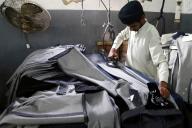

Pakistan's once robust textile industry now facing uncertainty
Pakistan’s once robust textile industry, considered the backbone of the economy, is under severe stress as several firms are inching towards default. Many of them have already shut down. The depleting foreign exchange reserves restricting imports of critical raw materials has dealt a brutal blow to this all-important sector. That apart, the frequent breakdown of the power sector with long stretches of blackouts and the destruction of large swathes of cotton crops during last year’s floods have added to the problem.
The industry has now urged the State Bank of Pakistan, the country’s central bank to extend the moratorium on debt under TERF (Temporary Economic Refinance Facility) and LTFF (long-term facing facilities) from June 1 to December this year or else it may lead to large defaults.
The two schemes– TERF and LTFF were launched by the erstwhile Imran Khan government to boost investments in the textile sector.
The Institute for Energy Economics and Financial Analysis noted that Pakistan lacks both energy and money, and is caught in a vicious cycle between the two. “The national blackout hit just as Pakistan’s foreign reserves and currency crisis entered a worrying new phase, raising fears of a debt default and IMF (International Monetary Fund) bailout,” it said, adding that reliance on expensive fuel imports, rampant inflation, fiscal fragility and currency devaluation are all part of the same positive feedback loop that is hampering economic development and eroding prosperity.
Millions have already been laid off and for those who continue working, delayed or reduced salaries have become the norm.
But most of them are quiet as they fear raising their voices could mean loss of employment.
But with the deepening crisis there is fear that joblessness will increase at a time when the country is battling one of its worst economic crises.
The worst impacted are the children, many of whom are hit by malnutrition or undernutrition. Several children are now being pulled out of schools as parents are often unable to support them amid steep rise in inflation coupled with shortage of essential items including food.
The textile industry in the country was responsible for more than 60 per cent of Pakistan’s exports. But exports have declined by 29 per cent year-on-year as of February 2023, totalling $487 million, the Express Tribune reported. From July 2022 to February 2023, total textile exports decreased 11 per cent to $1.35 billion compared to the previous financial year, it said.
Also read: Pakistan plunges further on terror index, now below Afghanistan: Report
Are Pakistan’s nuclear weapons and missiles on line during talks with the IMF?
Minister for Electronics and Information Technology Ashwini Vaishnaw said on Friday that the government is…
Renowned human rights activist and political analyst Amjad Ayub Mirza has expressed a strong denunciation…
As was widely expected, the Indian economy grew by 6.5 per cent in real terms…
World No Tobacco Day, marked annually on 31 May, addresses a major public health challenge--the…
Defence Minister Rajnath Singh, addressing officers and sailors onboard India's first indigenous aircraft carrier INS…
The leadership team from the Central Tibetan Administration (CTA) arrived in Tokyo to participate in…